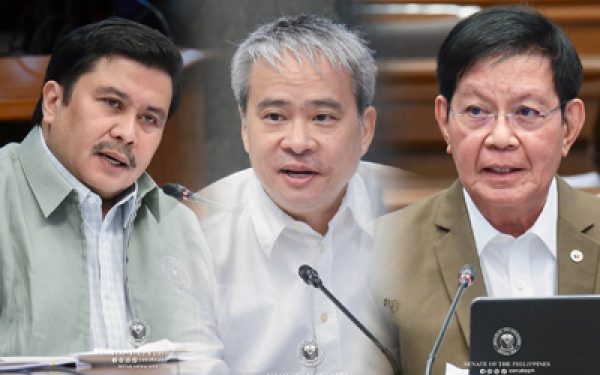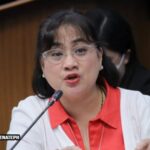Senate President Pro Tempore Panfilo “Ping” Lacson emphasized on Friday, September 19, that Senators Jinggoy Estrada and Joel Villanueva are not yet cleared regarding the issue of hundreds of millions of pesos in insertions in the 2023 and 2025 General Appropriations Act (GAA).
“By any measure, Senators Villanueva and Estrada have not been cleared, at least on the issue of budget insertions involving infrastructure projects in Bulacan worth P600M and P355M respectively, as alleged by Engr Brice Hernandez,” said Lacson.
During the Blue Ribbon Committee hearing on Thursday, Lacson stated that the P600 million allegedly allocated for flood control projects in Bulacan was found in the unprogrammed funds of the 2023 GAA.
This fund was linked by former Department of Public Works and Highways (DPWH) Bulacan 1st District Engineering Office assistant engineer Brice Ericson Hernandez. Villanueva strongly denied the allegations against him.
According to Lacson, the P600 million was seen in a document from Senator Sherwin Gatchalian and included in the slides.
During the hearing, Hernandez pointed out that the funds for Villanueva’s flood control projects allegedly came from the unprogrammed funds of the 2023 GAA.
“There are seven to eight items worth P75 million each, exactly P600 million,” said Lacson.
Lacson earlier stated that P355 million in infrastructure projects in Bulacan, linked by Hernandez to Estrada, were found in the 2025 GAA. Estrada refuted the allegations against him.
Meanwhile, in his post on X, Lacson said he allowed Estrada and Villanueva to attend the Blue Ribbon Committee hearing because it is a fundamental right for anyone to face their accuser.
Lacson is now awaiting “receipts” or evidence of the commission allegedly received by the two senators from the flood control projects.
Lacson said the “receipts” or evidence would serve as a basis not only for creating stronger anti-corruption laws but also to assist the Independent Commission for Infrastructure (ICI) and other prosecution bodies such as the Office of the Ombudsman and the Department of Justice.
Lacson also insisted that he and Senate President Vicente “Tito” Sotto III are now in “sagasa mode,” meaning they will not let anything slide and will spare no one.
“We discussed this with the Senate President. We are in full force at this point in our political careers. As long as there is evidence, we will spare no one,” said Lacson.
General Appropriations Act (GAA)
The General Appropriations Act (GAA) is not a physical place or cultural site, but a piece of legislation. It is the primary mechanism through which the U.S. Congress allocates federal funds to government agencies and programs for the upcoming fiscal year. Its history is rooted in the Congressional power of the purse established by the U.S. Constitution.
Blue Ribbon Committee
The Blue Ribbon Committee is not a specific place or cultural site, but rather a term for a high-level group of experts convened to investigate or advise on a significant issue. These committees are typically formed by governments or organizations to address complex problems and provide authoritative recommendations. The name originates from the blue ribbon traditionally symbolizing high honor or importance.
Department of Public Works and Highways (DPWH)
The Department of Public Works and Highways (DPWH) is the executive department of the Philippine government responsible for the planning, design, construction, and maintenance of national infrastructure, including highways, bridges, and flood control systems. It was formally established in its current form in 1987 but traces its origins back to the Spanish colonial-era public works office and the post-war Department of Public Works and Communications.
Bulacan 1st District Engineering Office
The Bulacan 1st District Engineering Office is a regional government agency under the Philippine Department of Public Works and Highways (DPWH). It is responsible for the planning, design, construction, and maintenance of national infrastructure, such as roads and bridges, within the 1st legislative district of Bulacan province. Its history is tied to the decentralization of the national public works system to better serve the infrastructure needs of specific local areas.
unprogrammed funds
“Unprogrammed funds” is not a physical place or cultural site; it is a financial term referring to government appropriations that are not allocated to specific projects or agencies in the initial budget. These funds are typically held in reserve and can be accessed later for emergency expenditures, contingent liabilities, or other unforeseen financial needs, as authorized by law.
Independent Commission for Infrastructure (ICI)
The Independent Commission for Infrastructure (ICI) is a government body responsible for overseeing and coordinating major public infrastructure projects. It was established to ensure transparent and efficient development of national infrastructure, such as transportation networks and public facilities. While its specific history varies by country, such commissions are typically created to centralize planning and improve accountability in public spending.
Office of the Ombudsman
The Office of the Ombudsman is an independent, impartial institution that investigates complaints from the public against governmental bodies and maladministration. The concept originated in Sweden in 1809 with the creation of the Justitieombudsman to oversee the government and ensure it followed laws. Its modern function has since been adopted by numerous countries worldwide as a key mechanism for protecting citizens’ rights and promoting government accountability.
Department of Justice
The United States Department of Justice (DOJ) is a federal executive department of the U.S. government, officially established in 1870 to enforce federal law and administer justice. It is headed by the Attorney General, a position that dates back to 1789, and its responsibilities include representing the government in legal matters and overseeing federal law enforcement agencies.


